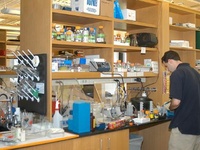
Harvard Law School student AHMED T. EL-GAILI ’98 spent the first semester of this year taking classes in London, waiting for his visa..
Since the beginning of this year, agitators among students and the Faculty have been pushing Harvard’s leaders to take a public stance on the host of new restrictions universities have encountered in the wake of the Sept. 11 terrorist attacks.
In September, when about a dozen Harvard students were unable to enter the country because of newly-tightened visa policies, several student groups wrote a letter to University President Lawrence H. Summers asking him to lobby on behalf of classmates stranded overseas.
“Standing by while these students are racially profiled goes against the very principles for which this university is respected,” the students wrote.
At a December Faculty meeting, an English professor asked how the University would respond if FBI agents requested the library or e-mail records of a foreign-born scholar—a possibility under the USA Patriot Act, which was passed by Congress in October 2001.
And in a February panel entitled “The State v. The Academy,” Dean of the Harvard School of Public Health Barry R. Bloom decried new restrictions on scientific research and criticized the decision of 32 peer-review journals to self-censor under the mounting pressure of national security concerns.
“It’s creating ignorance among the greatest universities and the brightest students,” he said.
At an April Faculty meeting, Summers took the microphone.
Speaking off the cuff, the president delivered his first bold statement on the University’s response to post-Sept. 11 legislation.
Summers invoked Harvards legendary protection of its faculty 50 years ago during the Red Scare, when Wisconsin Senator Joseph McCarthy and other government officials pressured universities nationwide to purge themselves of communists.
“I think we all, as members of this community, recognize that one of this community’s proudest moments was the way in which it stood up for the rights of its members in the time of the McCarthy period,” he told his assembled colleagues.
Despite Summers’ assessment of the University’s sterling record in the 1950s, closer scrutiny of Harvard’s response to McCarthyism reveals a public façade not entirely consistent with reality.
During the Red Scare, the University’s leaders resolved to stand firm against government probes. But Harvard conducted its own investigations of faculty members suspected of having communist associations, and some of these faculty members lost their jobs.
Today—as fear of terrorism leads Harvard and other universities to grapple with renewed challenges to academic freedom—the president’s bravado masks a position that has been cautious and consistent with Harvard’s historic reluctance to oppose prevailing political winds.
Narrowing Gates
Senior Director for Federal and State Relations Kevin Casey, Harvard’s top lobbyist in Washington, says he ran into Sharon Ladd, Director of the Harvard International Office (HIO), a few days after Sept. 11, 2001.
Read more in News
Pataki: 'Yale is Going to Crush Harvard'













